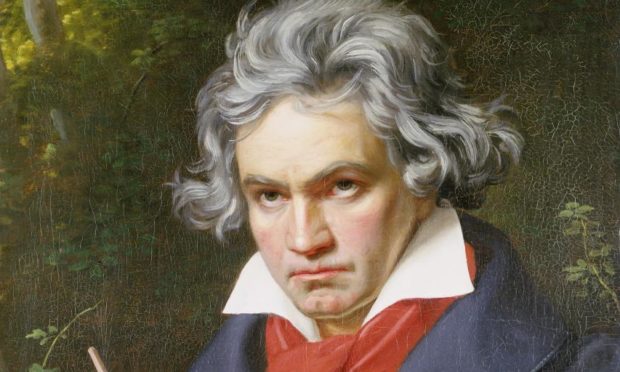Sanitised versions of Gaelic songs were reinterpreted by Beethoven without the great composer realising their true meaning, a new documentary has uncovered.
The programme reveals Beethoven made classical arrangements of 47 Gaelic melodies from 1809 to 1820 for the Edinburgh-based folklore collector and publisher George Thomson.
German musicologist and Gaelic scholar Dr Michael Klevenhaus spent five years researching the origins of the compositions.
He became aware of the connection in 2015 while reading a scholarly work by piper Allan MacDonald who stated the song Enchantress Farewell, arranged by Beethoven with words by Sir Walter Scott, was based on Mhnathan a’ Ghlinne Seo (Women of the Glen).
Suspecting there may be more Gaelic tunes hidden in the works of the maestro, Dr Klevenhaus set out to find the original music.
The BBC Alba programme follows Dr Klevenhaus as he travels from Beethoven’s birthplace, Bonn, to Vienna, where the composer worked, and through the Scottish Highlands, islands and lowlands where he speaks to Gaelic singers and musicians including Màiri MacInnes and Allan MacDonald.
He uncovers that the melodies’ Gaelic origins were deliberately hidden from Beethoven, and the public, by George Thomson.
With the 1745 Jacobite Rebellion still within living memory, Thomson stripped the Gaelic songs of their titles, lyrics and any ‘taint’ of Jacobitism. Dr Klevenhaus believes there’s a link, for example, between Beethoven’s love song Erin o’ Erin and a song by Sìleas Na Ceapaich about the 1715 Jacobite Uprising.
He said: “Gaelic songs are often highly political, but the meaning of these songs was hidden from Beethoven.
“Beethoven was strongly political, if he had been sent those words what a different song we would have today.
“What would a radical republican like Beethoven have made of a political song by Sìleas Na Ceapaich, about people rising united against the king?”
He added; “It’s been fascinating to discover the highly political nature of some of the original songs. It seems likely that these songs were deliberately sanitised to make them more suitable for an upper-class Lowland audience.”
Òrain Ghàidhlig Beethoven airs on Wednesday, December 16 at 9pm, followed by a concert of Gaelic songs and Beethoven’s arrangements of them – Beethoven: A’ Chuirm Ghàidhlig at 10.30pm, both on BBC Alba.
The songs
German-born Michael Klevenhaus became entranced by the language and culture of Gaelic Scotland as a young boy.
He learned the language and songs and later founded the German Center for Gaelic Language and Culture in Bonn. He examined the connection between the Scottish songs of Beethoven and Haydn and the Gaelic musical tradition.
In 2013 he was awarded the International Gaelic Award of Bòrd na Gàidhlig for his services to the Gaelic language and culture in Germany.
The documentary of Ludwig Van Beethoven’s Gaelic compositions will be screened ahead of the 250th anniversary of the composer’s christening on December 17 1770. His birth date is unknown, although it is likely to have been on the previous day.
Songs by Beethoven believed to be linked to Gaelic melodies include Mnathan a’ Ghlinne Seo (which became Enchantress, Farewell); Mòrag Bheag, Nighean Mhurchaidh an t-Saoir (Bonnie Laddie, Highland Laddie); part of Cumha Mhic an Tòisich (Oh Oho Chrio); Thugaibh Dream Do Bhaldi Chaoilein (The Maid of Islay); Mo Mhallachd Air Na Caoraich Mhòr (connected to Sunset) and • Sìleas Na Ceapaich: Tha Mi Nam Chadal (Erin o’ Erin)
The concert of his arrangements of Gaelic songs will features performances by traditional singers Màiri MacInnes and Michael Klevenhaus; Scottish piper Allan MacDonald and German piper Thomas Zöllner; Scottish classical singers Lorna Anderson and Jamie MacDougall and classical instrumentalists Verena Stourzh, Franz Ortner and Clemens Zeilinger, of the TrioVanBeethoven.
